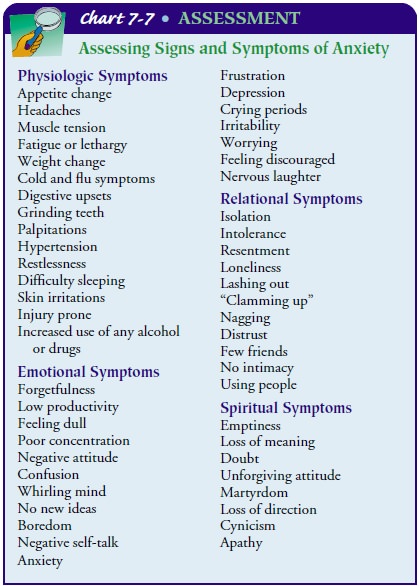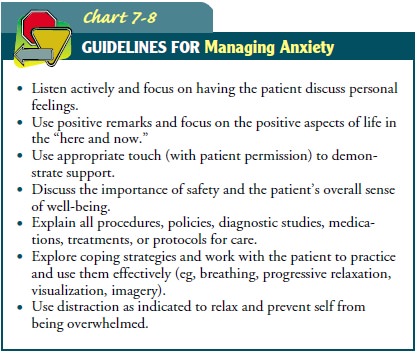Chapter: Medical Surgical Nursing: Individual and Family Considerations Related to Illness
Anxiety
Anxiety
All people experience
some degree of anxiety (a tense
emotional state) as they face new, challenging, or threatening life situations.
In clinical settings, fear of the unknown, unexpected news about one’s health,
and any impairment of bodily functions engenders anxiety. Although a mild level
of anxiety can mobilize people to take a position, act on the task that needs
to be done, or learn to alter lifestyle habits, a more severe level can be almost
paralyzing. Anxiety that escalates to a near panic state can be incapacitating.
When patients receive unwelcome news about results of diagnostic studies, they
are sure to experience anxiety. Different patients man-ifest the physiologic,
emotional, and behavioral signs and symptoms of anxiety in various ways
(Nursing Research Profile 7-1).
NURSING IMPLICATIONS
Early clinical
observations of guilt or anxiety are an essential component of nursing care
(Chart 7-7). A high level of anxiety in a patient will probably exacerbate
physiologic distress. For exam-ple, a postoperative patient who is in pain may
discover that anx-iety intensifies the sensation of pain. A patient newly
diagnosed with type 1 diabetes mellitus may be worried and fearful and therefore
unable to focus on or complete essential self-care activ-ities. The possibility
of developing somatic symptoms is high in any patient who is experiencing
moderate to severe anxiety.

The DSM-IV TR (2000) lists general medical conditions that cause anxiety. They include endocrine diseases, such as hypo-thyroidism, hyperthyroidism, hypoglycemia, and hyperadrenocor ticism; cardiovascular conditions, such as cardiac dysrhythmia, con-gestive heart failure, and pulmonary emboli; respiratory problems, such as pneumonia and chronic obstructive pulmonary disease; and neurologic conditions, such as encephalitis and neoplasms.
Every nurse must be
vigilant about the patient who worries ex-cessively and demonstrates
deterioration in emotional, social, or occupational functioning. If
participation in the therapeutic reg-imen (eg, administration of insulin)
becomes a problem because of extreme anxiety, nursing interventions must be
immediately initiated. Caring strategies emphasize ways for the patient to
ver-balize feelings and fears and to identify sources of anxiety. The need to
teach and promote effective coping abilities and the use of relaxation
techniques are the priorities of care. In some cases, antianxiety medication
may be prescribed. Chart 7-8 provides a list of basic nursing principles that
are useful for assisting patients to manage severe anxiety.

Related Topics